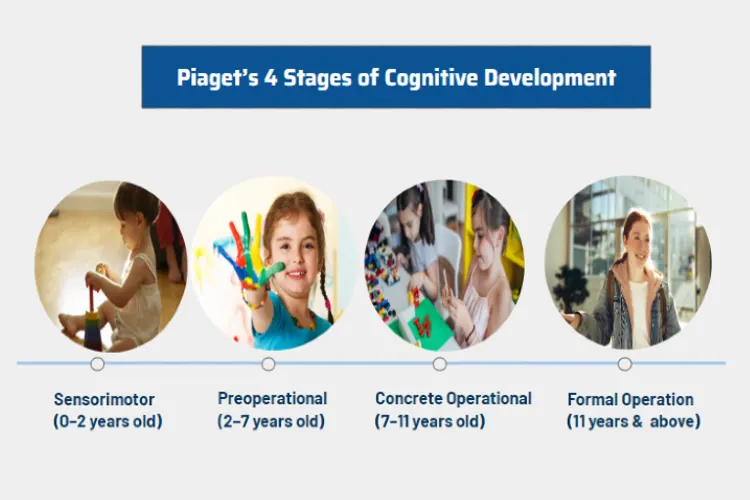The Cognitive Development of children was substantially improved by the work of Swiss psychologist Jean Piaget. Piaget’s observations on children’s cognitive development were major contributors to the field of psychology. Piaget postulated that kids of a particular age tended to answer questions incorrectly with the same kinds of responses. He created a theory on how children’s cognitive processes developed based on observations and subsequent interviews with kids about these errors. His finding has several significant ramifications, one of which is that children do not inherit the same cognitive abilities as adults. Children’s cognitive processes, in contrast:
- Develop as they age,
- Change in response to their surroundings, and
- Become updated when they are exposed to fresh knowledge.
Piaget proposed that a child’s cognitive development happens in stages. In particular, he stated that children’s behavior changes as their cognitive abilities advance from one stage to the next, mirroring cognitive advancements. According to his idea, the stages are sequential and each stage merely follows the one before it. These stages are:
- Sensorimotor (0–2 years old)
- Preoperational (2–7 years old)
- Concrete Operational (7–11 years old)
- Formal Operation (11 years & above)
If you want to know more about it then our expert therapists are always available to help you.
Piaget’s 4 Stages of Cognitive Development
The Sensorimotor Stage:
In the first stage of Cognitive Development children primarily learn about their surroundings through their senses and motor activity. There are six sub stages that make up the sensorimotor stage, during which children’s behaviour transitions from being reflex-driven to being more abstract. The key objective at this point is to develop an understanding of object permanence, or the idea that an object still remains even if it’s concealed or hard to see.
The Preoperational Stage:
Children begin to use mental abstractions as they reach the end of the sensorimotor stage. They employ mental representations rather than the physical appearance of items or people when they are two years old, entering the preoperational stage. Pretend play and chatting about things that happened in the past or other individuals who aren’t present are instances of abstract representations. During this stage, other intriguing Cognitive Developments take place. Children, for instance, comprehend causation. Children also grasp that despite differences in appearance, things and individuals retain their identities. For instance, during this stage, a caregiver dressed as Santa Claus might not be as convincing at some point. Children continue to learn more about categorization at this stage. They can group things according to their similarity or distinction. Additionally, they begin to comprehend quantity and numbers, including words like “more” and “larger.”
The Concrete Operational Stage:
This stage starts at age seven. Children at this age are better able to solve difficulties since they can weigh several possibilities and viewpoints. At this stage, all of their cognitive faculties are more fully developed. Children’s categorization skills advance when they learn how to arrange objects along a dimension, comprehend that categories contain subcategories, and connect two objects using a third object. Their arithmetic skills significantly advance, and they are able to carry out increasingly challenging mathematical operations. They have higher spatial skills. They are more accurate in determining distance and time. They are able to read maps and explain how to get from one place to another.
The Formal Operation Stage:
Children begin the formal operational stage at the age of 11. This phase is characterized by abstract thought. Children are not constrained by the present and are able to think about abstract ideas. They can conceive of hypothetical circumstances and other possibilities, such as those that do not yet exist, might never exist or might be improbable and fantastical. Children can use hypothetical-deductive reasoning at this age to test hypotheses and make inferences based on the findings. Children at the formal operational stage can use their reasoning abilities to apply increasingly complex problems in a systematic, logical manner, in contrast to younger children who approach problems randomly.
Experience Online Psychologist
Conclusion
The next time you explain anything to a youngster, remember that their Cognitive Development restricts their capacity for learning and understanding. Below mentioned tips can be useful in making our interaction with the kids meaningful.
- Use straightforward, kid-friendly examples.
- Explain ideas simply while taking into account the constraints of each cognitive stage.
- Encourage conversation and imagination to produce memorable interactions and experiences.
Most importantly, keep in mind that kids are not “mini-adults” when they are born. They lack the life experiences necessary for the development of adult cognitive capacities as well as the adult cognitive talents themselves. Instead, kids must actively engage with their environment and the people that live there in order to learn. For learning to take place, individuals must be exposed to new situations and knowledge, and more significantly, they must be given the chance to fail.
Are you struggling as a parent? You are not the only one. Our wellness experts at Ganeshaspeaks.com can guide you through your beautiful journey.



